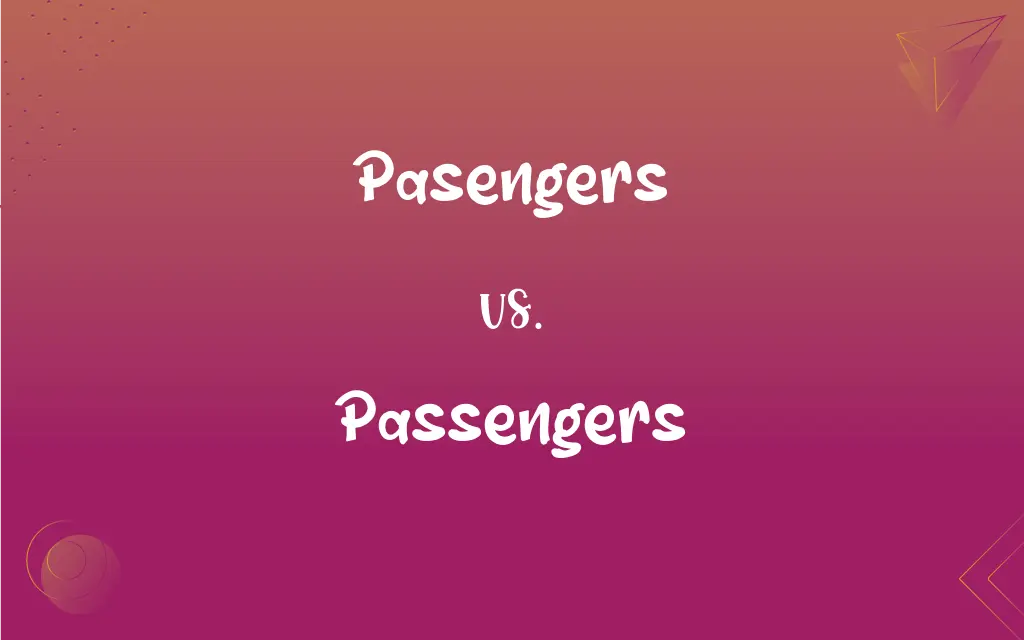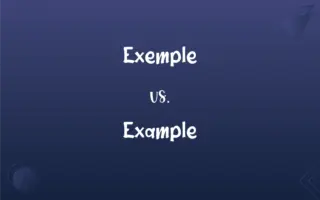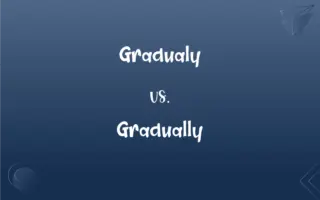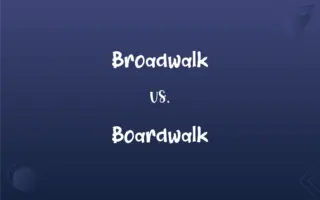Pasengers vs. Passengers: Mastering the Correct Spelling
Edited by Aimie Carlson || By Janet White || Updated on March 11, 2024
"Pasengers" is incorrect, while "Passengers" is the right spelling, referring to individuals traveling in a vehicle.

Which is correct: Pasengers or Passengers
How to spell Passengers?

Pasengers is Incorrect

Passengers is Correct
ADVERTISEMENT
Key Differences
Remember, a bus carries passengers, both have double S's.
Associate "Passengers" with "messages," both have double S's.
"Passengers" has two S's, like a train needs a pair of rails to run.
A passenger passes time, hence the 'ss' in the middle.
Think of the word "pass" which is the root of "Passengers," reminding you to use two S's.
ADVERTISEMENT
Correct usage of Passengers
Many pasengers missed their connecting flights.
Many passengers missed their connecting flights.
The ship was designed to accommodate 3000 pasengers.
The ship was designed to accommodate 3000 passengers.
The flight had 200 pasengers on board.
The flight had 200 passengers on board.
We need to ensure all pasengers have boarded.
We need to ensure all passengers have boarded.
The train can hold up to 500 pasengers.
The train can hold up to 500 passengers.
Passengers Definitions
"Passengers" are individuals who travel in a vehicle without participating in its operation
The bus was full of passengers.
"Passengers" can also be metaphorical, referring to inactive participants
In life’s journey, active participants fare better than mere passengers.
"Passengers" can refer to people carried on a ship or aircraft
The ship's passengers enjoyed their cruise.
They are travelers in a public or private conveyance other than the driver or crew
Airplanes carry millions of passengers annually.
It denotes those who pay to be transported from one place to another
Taxi drivers depend on passengers for their income.
A person who travels in a conveyance, such as a car or train, without participating in its operation.
(Informal) A person who participates only passively in an activity.
(Archaic) A wayfarer or traveler.
Plural of passenger
Passengers Sentences
Train passengers enjoyed scenic views of the countryside.
The captain welcomed all passengers aboard the cruise ship.
The bus was full, leaving no seats for additional passengers.
The ferry can transport up to 100 passengers across the lake.
School bus passengers are required to remain seated while the bus is moving.
Airport staff assisted passengers with special needs.
Flight attendants are trained to ensure the safety of all passengers.
Lost luggage is a common concern among airline passengers.
Passengers on the flight were advised to fasten their seatbelts.
All passengers must go through security screening before boarding.
The new metro line can carry thousands of passengers daily.
Passengers were delighted by the unexpected upgrade.
The tour guide entertained the passengers with historical facts.
Shuttle passengers were transported directly to the hotel.
Passengers were asked to turn off all electronic devices during takeoff and landing.
The taxi driver shared stories of his most memorable passengers.
During the storm, passengers were advised to stay indoors.
Boat passengers were treated to a stunning sunset view.
Elevator passengers are limited to five people due to safety protocols.
Cruise ship passengers participated in various onboard activities.
FAQs
What is the root word of Passengers?
The root word is "passage."
What is the verb form of Passengers?
The related verb is "passage."
Which vowel is used before Passengers?
The vowel "e" is used before "passengers."
Why is it called Passengers?
It's derived from "passage," indicating those who travel.
What is the singular form of Passengers?
The singular form is "passenger."
What is the plural form of Passengers?
"Passengers" is the plural form.
Which preposition is used with Passengers?
"Of" is commonly used (e.g., passengers of a car).
Which conjunction is used with Passengers?
Standard conjunctions like "and" or "but" can be used.
Is Passengers a noun or adjective?
"Passengers" is a noun.
What is the pronunciation of Passengers?
Pronounced as PAS-uhn-jers.
Is Passengers an adverb?
No, it is a noun.
Is the word Passengers imperative?
No, it is not imperative.
What is the first form of Passengers?
The base form is "passenger."
Is Passengers an abstract noun?
No, it is a concrete noun.
What part of speech is Passengers?
"Passengers" is a noun.
What is the opposite of Passengers?
There's no direct antonym, but "driver" or "operator" might serve in context.
Which article is used with Passengers?
"The" or "some" can be used, depending on context.
What is a stressed syllable in Passengers?
The first syllable, "pas," is stressed.
What is another term for Passengers?
Another term is "travelers."
What is the third form of Passengers?
There's no third form as it's a noun.
How is Passengers used in a sentence?
"The train was delayed, causing inconvenience to hundreds of passengers."
Is Passengers a negative or positive word?
It is neutral; context defines the connotation.
Is Passengers a vowel or consonant?
"Passengers" is a word, not a vowel or consonant.
Is Passengers a countable noun?
Yes, it is countable.
Is Passengers a collective noun?
No, it's a plural noun, not collective.
How many syllables are in Passengers?
There are three syllables.
How do we divide Passengers into syllables?
It is divided as pas-sen-gers.
Which determiner is used with Passengers?
Determiners like "the," "some," or "few" can be used.
Is the Passengers term a metaphor?
It can be used metaphorically.
What is the second form of Passengers?
There's no second form as it's a noun.
About Author
Written by
Janet WhiteJanet White has been an esteemed writer and blogger for Difference Wiki. Holding a Master's degree in Science and Medical Journalism from the prestigious Boston University, she has consistently demonstrated her expertise and passion for her field. When she's not immersed in her work, Janet relishes her time exercising, delving into a good book, and cherishing moments with friends and family.
Edited by
Aimie CarlsonAimie Carlson, holding a master's degree in English literature, is a fervent English language enthusiast. She lends her writing talents to Difference Wiki, a prominent website that specializes in comparisons, offering readers insightful analyses that both captivate and inform.


































































